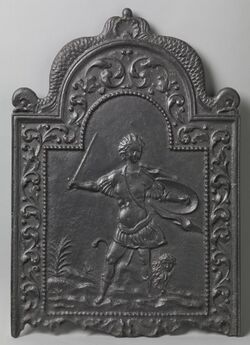Religion:Lion of Cithaeron
The Lion of Cithaeron[lower-alpha 1] was a lion in Greek mythology which harassed the lands of king Amphitryon and king Thespius or of king Megareus. Some myths say that it was killed by Heracles, while others say it was slain by Alcathous of Elis.
According to the Suda, it was also called the Thespian lion and the Ravine lion (Ancient Greek:, Charadraios leōn) because it lived in a place called "Ravine" (Ancient Greek:, charadra).[1]
Heracles
One account of the myth, recorded by Apollodorus in the Bibliotheca, states that the lion came from Cithaeron to hunt the cattle belonging to Amphitryon and to King Thespius of Thespiae. When Heracles was eighteen years old, Thespius asked him to kill the lion. The hunt took Heracles fifty days, during which Thespius hosted him (and each night of which Heracles slept with a different daughter of the king). After Heracles slew the lion, he dressed himself in its skin and wore its scalp as a helmet.[2] According to the Suda, it was killed near Thespiae, before Heracles killed the Nemean lion.[1]
Alcathous
According to Pausanias, writing in the second century BC, the Megarians believed that the Cithaeronian Lion killed many people, including Euippus, the son of their king Megareus. Consequently, Megareus promised that whoever killed the Lion would marry his daughter and inherit his throne. Alcathous killed the lion and when he became the king, he built the temple of Artemis Agrotera (Huntress) (Ancient Greek:) and Apollo Agraeus (Hunter) (Ancient Greek:).[3][4]
Notes
- ↑ Which is also spelled Kathairon or Kithairon, and the beast is thus sometimes called the Lion of Kathairon.
References
- ↑ 1.0 1.1 Suda. pp. chi.88. https://topostext.org/work/240#chi.88.
- ↑ Pseudo-Apollodorus. "4" (in Ancient Greek). Bibliotheca. 2. pp. 10-11. https://www.perseus.tufts.edu/hopper/text?doc=Apollod.+2.4&fromdoc=Perseus%3Atext%3A1999.01.0022.
- ↑ Pausanias. "41" (in Ancient Greek). Ἑλλάδος Περιήγησις. 1. pp. 3-6. https://www.perseus.tufts.edu/hopper/text?doc=urn:cts:greekLit:tlg0525.tlg001.perseus-grc1:1.41.
- ↑ William Smith (1873). "Agraeus". A Dictionary of Greek and Roman biography and mythology. London. https://www.perseus.tufts.edu/hopper/text?doc=Perseus:text:1999.04.0104:entry=agraeus-bio-1.
- Gantz, Timothy (1993). Early Greek Myth: A Guide to Literary and Artistic Sources. Johns Hopkins University Press. pp. 379. ISBN 0-8018-4410-X. https://archive.org/details/early-greek-myth-a-guide-timothy-gantz/page/378/mode/2up.
- Griffiths, Alan H. (2015). "Alcathous". Oxford Research Encyclopedia of Classics. doi:10.1093/acrefore/9780199381135.013.258. ISBN 978-0-19-938113-5.
 |


